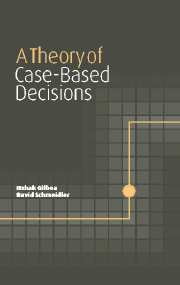7 - Learning and induction
Published online by Cambridge University Press: 22 September 2009
Summary
This chapter studies several ways in which case-based decision makers learn from their experience. First, we discuss aspiration-level adjustment and its impact on behavior. We then proceed to discuss examples in which the similarity function is also learned. Finally, we conclude with some comments on inductive reasoning.
Learning to maximize expected payoff
Aspiration-level adjustment
The reader may find decision makers who maximize the function U less rational than expected utility maximizers. The former satisfice rather than optimize. They count on their experience rather than attempt to figure out what will be the outcomes of available choices. They follow what appears to be the best alternative in the short run rather than plan for the long run. They use whatever information they happened to acquire rather than intentionally experiment and learn from a growing experience.
There are many applications for which we find this boundedly rational image of a decision maker quite plausible, and it can even pass the rationality test proposed in Section 2. Especially in novel situations, people often find it hard to specify the space of states of the world in a satisfactory way, let alone to form a prior over it. Many if not most of the decisions taken by governments, for instance, are made in complex environments that have not been encountered before in precisely the same way.
Information
- Type
- Chapter
- Information
- A Theory of Case-Based Decisions , pp. 146 - 188Publisher: Cambridge University PressPrint publication year: 2001
